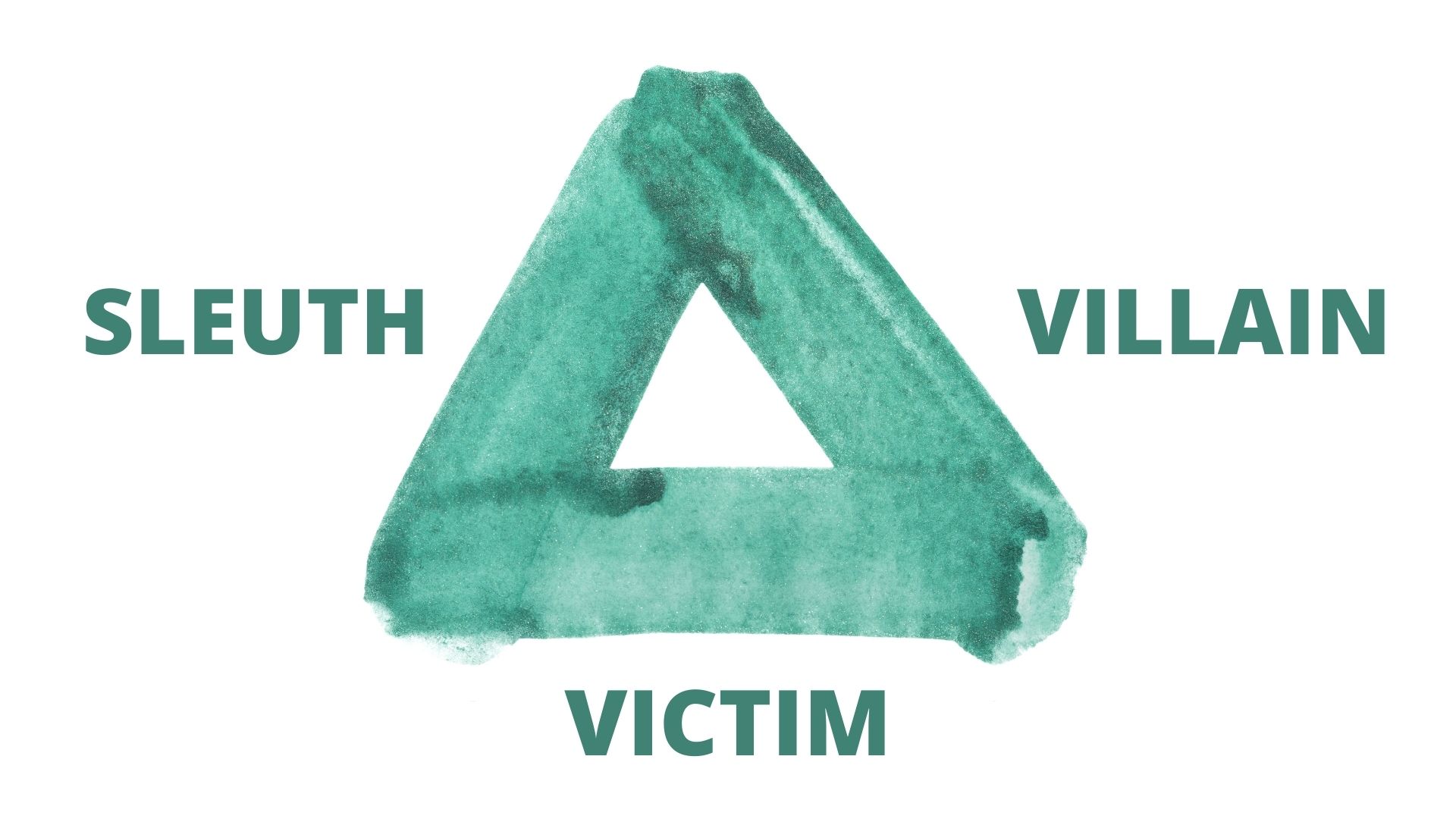The Mystery’s Magic Character Triangle

The Character Base for Your Story
Unlike most novels with a hero and a villain, protagonist and antagonist, a mystery requires three main characters: the victim, the sleuth, and the villain. These three characters form the base triangle for any mystery novel.
Each of these characters plays a major role in a mystery. As a writer, you must have all three for the mystery to work. And unlike most other novel genres, in a mystery, two of these characters are hidden from the reader. The victim’s life is revealed slowly to point toward the villain, but at the start of the story, the reader knows nothing about either character.
In a series with the same sleuth, each story has a different victim and villain. The sleuth works to discover the relationship between the victim and the villain that leads to the final puzzle piece, the reveal. Same sleuth, different victim and villain.
When you understand each character, you can build relationships and antagonisms that lead toward the conclusion. Without a strong background for each of these main characters, your mystery will fall flat. Your reader may guess the villain before the conclusion. The victim won’t seem worthy of killing. Your sleuth won’t be challenged.
The Victim
The victim is the rai·son d’ê·tre of the mystery. Without the victim, your sleuth would have nothing to do—no clues to find, no suspects to interview, no puzzle to solve. There would be no mystery.
As a writer, you need to build a strong character background for your victim. Even though they have no speaking part and appear as a corpse, the victim is the foundation of the mystery. Suspects derive from their circle of friends and enemies. You sleuth learns about their quirks, likes and dislikes, and personality traits by interviewing the suspects.
The first half of the novel is spent discovering the victim’s world. The reader learns through clues and suspects about the victim’s circumstances and their relation to other people and the world they inhabit.
The reader follows your sleuth’s investigation. Along with the sleuth, they form opinions about the victim; a despicable human, a seemingly virtuous soul, a likeable scoundrel. And, like the sleuth, they try to guess why the victim was killed and who did it.
So, your victim is more than just a dead body. Something they did triggered a murder, and you, the writer, need to know why.
The Villain
A challenge for mystery writers is creating an antagonist worthy of your sleuth while keeping them hidden at the same time. In order to accomplish this and keep your reader guessing until the end, you need to create a full, deep character background.
To make the murder believable, you need to tie your villain’s motivations to the victim’s personality. Until you know the victim’s personality, you will lack a true motivation for the villain. It’s backstory gone wild except you can only dribble tiny pieces of this backstory into the novel.
Until you know the motivations and methods of the villain, you won’t be able to keep them a secret. The villain works behind the scenes through most of your novel. But, you need to know the why and how in order to hide the villain in plain sight.
At the same time, you need to know how the villain puts pressure on the sleuth, leads them down false trails, and hides their antagonism to the sleuth.
The Sleuth
Your sleuth is your guy or gal who shines. Your hero. You need to know more about this character than any other character in your story. You build tension through conflict. You need to know how your protagonist sleuth reacts to any situation. And, that reaction must be in character.
Not only do you need to supply your sleuth with an amory of detecting skills, you need to know a variety of character traits. They need to respond to the obstacles and conflicts in ways that reflect their character and yet surprise your reader in order to keep your story from being predictable.
Your sleuth’s difficulties arise from their strengths and weaknesses that can blind them from interpreting what they learn from clues and suspects. For example, a personal prejudice against a suspect may keep your sleuth from “hearing” important information. You need to know not just strengths and weaknesses, but personal preferences and antipathies. These traits hold precedence over their physical traits like size or hair color.
The more you know about your sleuth, you’ll be better able to give your sleuth in-character responses to any situation. This knowledge will help you create imaginative and unique situations for your first novel and any that follow in a series.
Create A Strong Triangle
Before you begin writing, work on your character development for your three main characters. You’ll find as you develop your storyline and while you are writing that your full knowledge will help you create unique and believable situations in your mystery.







